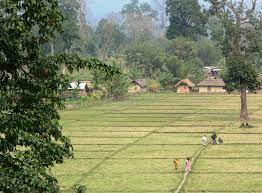Fundamentals of Environmental Resource Management
Environmental resource management is a key aspect in environmental studies. This article is expository on some fundamental issues and background discussion to this course and this programme in general. You will find it particularly interesting as it links and expose you to fundamental truths about the genesis of environmental problems and the need for the management of our finite resources.
What Is Resource?
Environmental scientist perspective: A resource may be defined as anything we obtain from the earth’s life support systems or environment made available by nature for survival needs. Every form of life requires resources such as food, water and shelter for survival and well-being.
Resources may be classified as:
• Renewal
• Potentially renewable
• Non – renewable (Miller, 1999).
Renewable perpetual resources are humanly speaking inexhaustible. Examples include the sun’s energy, winds, flowing water.
Potentially renewable resources can be replenished by nature fairly rapidly. Examples include fertile soil, biodiversity and several others.
When the rate of usage does not exceed supply the availability is referred to as sustainable yield; where it exceed supply then environmental degradation sets in.
Non-renewable resources are exhausted at the rate of consumption and are not replenished. Hence, they can be used-up or exhausted. Examples include crude oil, natural gas, metallic and non-metallic minerals.

Read Also : How to Reduce the Amount of Wastes Produced
Environmental Economist Perspective: A resource may be defined as a means in nature that is available for supplying living organism’s want. Minerals and fossil fuels are described as;
• Stock
• Resource
• Reserve (Gurdeep, 1990)
The stock of a substance is the total amount of that substance contained in the environment, much of which will be inaccessible or unprocessable by present day technology.
Crude oil would have fallen into this category before it was discovered. It was a mysterious fluid until we learned how to find it, extract it and refine it into gasoline, heating oil and other products that could be sold at affordable prices. Thus, a stock may not be classified as a resource because:
It is not a means It cannot supply living organism’s want
This is a result of human limitations and not a deficiency resident in the material in nature. Human are yet to unveil its use as a mean of supplying want.
Resource is that part of the stock that could be used based on specified social, economic and technological conditions. Estimates of resources are dynamic and are based on economic (e.g., alternation in prices), social and technological changes (e.g. a new technology may increase the quantity of a resource).
Reserves are that part of the resource that can be tapped using contemporary technology under current economic and social conditions.
Reserves may be further classified into proven, probable and possible recoverable reserves, all of which have been identified, but some of which will be Para marginal or sub marginal, and undiscovered reserves which are either hypothetical resources or specified resources, their location being unknown or known respectively (Gurdeep, 1990).
Some resources, such as solar energy, fresh air, wind, fresh water, fertile soil and wild edible plants, are directly available for use by us and other organisms.
Some other resources, such as crude oil, tin, ground water (water found deep in the ground), and some modern crops, aren’t directly available. They become available for use when and if some effort and or technology are applied or employed.



